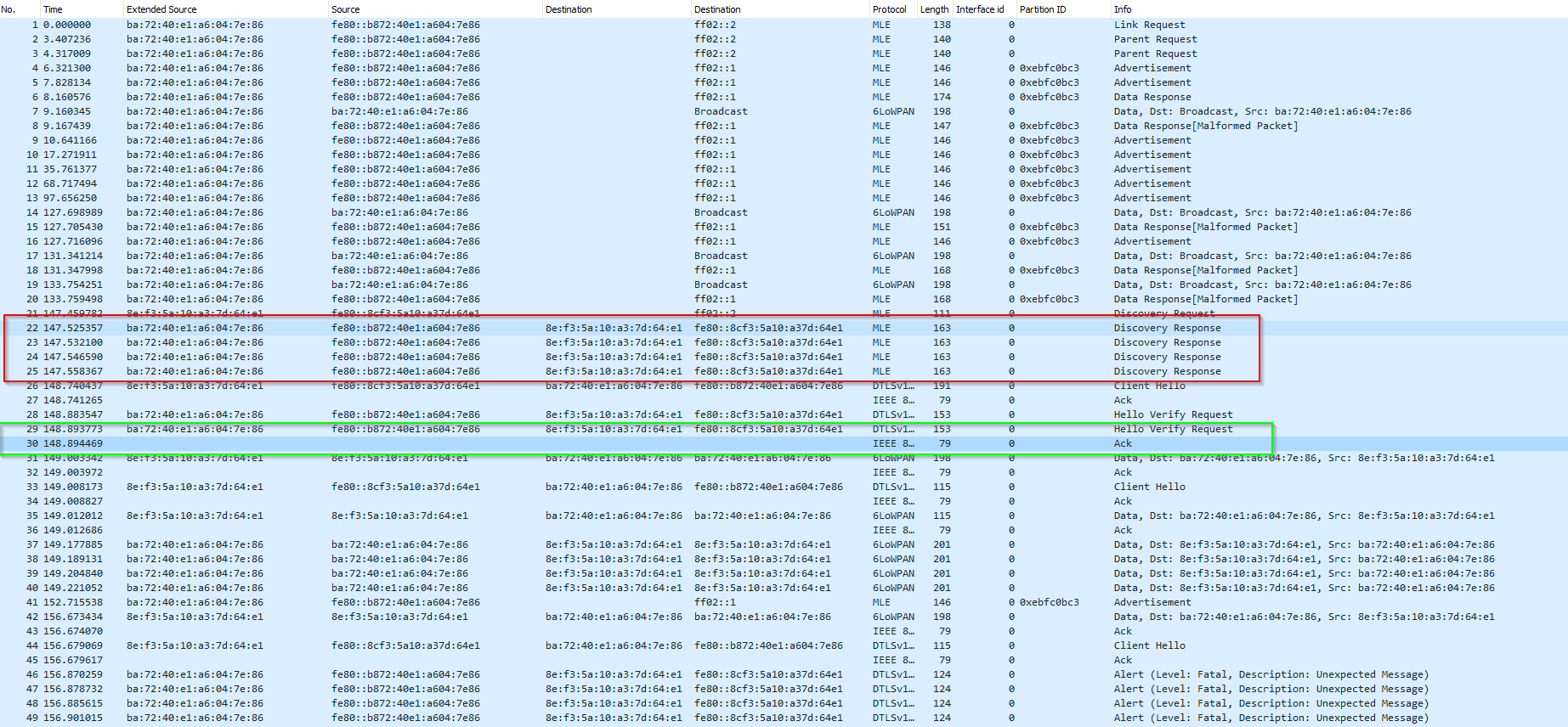It seems sending FORCE_TRX_OFF stops the transmission of ACKs.
Also mentioned in the datasheet http://ww1.microchip.com/downloads/en/devicedoc/atmel-8351-mcu_wireless-at86rf233_datasheet.pdf:
RX_AACK - Receive with Automatic Acknowledgement A state transition to RX_AACK_ON is initiated by writing the RX_AACK_ON command to the register bits TRX_CMD. On success, reading register bits TRX_STATUS (register 0x01, TRX_STATUS) returns RX_AACK_ON or BUSY_RX_AACK. The latter one is returned when a frame is being received. The RX_AACK Extended Operating Mode is left by writing a new command to the register bits TRX_CMD. If the Atmel AT86RF233 is within a frame receive or acknowledgment procedure (BUSY_RX_AACK), the state change is executed after finishing. Alternatively, the commands FORCE_TRX_OFF or FORCE_PLL_ON can be used to cancel the RX_AACK transaction and switch to TRX_OFF or PLL_ON state respectively
Commenting the following, makes ACK work for me:
diff --git a/drivers/ieee802154/ieee802154_rf2xx.c b/drivers/ieee802154/ieee802154_rf2xx.c
index 876352857d..6fa9e2b7b8 100644
--- a/drivers/ieee802154/ieee802154_rf2xx.c
+++ b/drivers/ieee802154/ieee802154_rf2xx.c
@@ -69,12 +69,12 @@ static void trx_isr_timeout(struct k_timer *timer_id)
static void rf2xx_trx_set_state(struct device *dev,
enum rf2xx_trx_state_cmd_t state)
{
- do {
- rf2xx_iface_reg_write(dev, RF2XX_TRX_STATE_REG,
- RF2XX_TRX_PHY_STATE_CMD_FORCE_TRX_OFF);
- } while (RF2XX_TRX_PHY_STATUS_TRX_OFF !=
- (rf2xx_iface_reg_read(dev, RF2XX_TRX_STATUS_REG) &
- RF2XX_TRX_PHY_STATUS_MASK));
+ // do {
+ // rf2xx_iface_reg_write(dev, RF2XX_TRX_STATE_REG,
+ // RF2XX_TRX_PHY_STATE_CMD_FORCE_TRX_OFF);
+ // } while (RF2XX_TRX_PHY_STATUS_TRX_OFF !=
+ // (rf2xx_iface_reg_read(dev, RF2XX_TRX_STATUS_REG) &
+ // RF2XX_TRX_PHY_STATUS_MASK));
do {
rf2xx_iface_reg_write(dev, RF2XX_TRX_STATE_REG, state);
@@ -85,8 +85,8 @@ static void rf2xx_trx_set_state(struct device *dev,
static void rf2xx_trx_set_rx_state(struct device *dev)
{
- rf2xx_trx_set_state(dev, RF2XX_TRX_PHY_STATE_CMD_TRX_OFF);
- rf2xx_iface_reg_read(dev, RF2XX_IRQ_STATUS_REG);
+ // rf2xx_trx_set_state(dev, RF2XX_TRX_PHY_STATE_CMD_TRX_OFF);
+ // rf2xx_iface_reg_read(dev, RF2XX_IRQ_STATUS_REG);
/**
* Set extended RX mode
* Datasheet: chapter 7.2 Extended Operating Mode
@@ -214,8 +214,8 @@ static void rf2xx_thread_main(void *arg)
/* Set PLL_ON to avoid transceiver receive
* new data until finish reading process
*/
- rf2xx_trx_set_state(dev,
- RF2XX_TRX_PHY_STATE_CMD_PLL_ON);
+ // rf2xx_trx_set_state(dev,
+ // RF2XX_TRX_PHY_STATE_CMD_PLL_ON);
k_timer_stop(&ctx->trx_isr_timeout);
rf2xx_trx_rx(dev);
rf2xx_trx_set_state(dev,

Describe the bug The newly introduced at86rf2xx driver is not sending ACKs.
@nandojve, many thanks for developing and upstreaming the at86rf2xx radio driver! I have been trying to use the driver on a custom hardware with an STM32 uC and the RF233 using OpenThread.
However, I am not (reliably) getting ACKs, as can be seen in the following capture:
The debug output indicated that the correct address filter is being set (
ieee802154_rf2xx.rf2xx_set_ieee_addr: IEEE address 8e:f3:5a:10:a3:7d:64:e1) and works as the packets sent to the 64bit address are received.To Reproduce Build echo_client with ot-overlay.conf and commission against a Thread BR, e.g. based on nrf52840.
Expected behavior ACKs are being sent.
Impact Device cannot be joined onto Thread network, because DTLS gets multiple unexpected link-layer retransmitted packets.
Environment (please complete the following information):